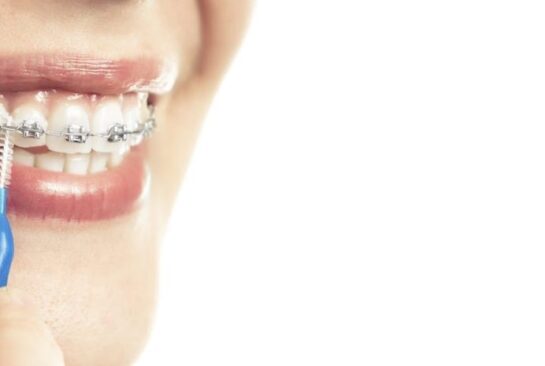- SHOWCASE

Oral Hygiene for Metal Braces
Having confidence in your smile can help boost your overall self-confidence. However, having misaligned teeth might make you reluctant to smile. Alignment issues can also lead to further oral hygiene problems as effective brushing and flossing can be harder.
Braces are a traditional, tried-and-tested way to correct alignment issues. While orthodontics are often associated with children and teens, adults are increasingly turning to them to help straighten their teeth.
However, food particles can become trapped or stuck to the fixed metal brackets which can lead to decay if not properly cleaned. Therefore, it is important to keep to a regular oral hygiene routine. Such a routine is easy to adopt and should become part of your daily routine.
What Are Braces and How Do They Benefit You?
Traditional metal braces are used to straighten and correct oral issues such as crowded, crooked, or protruding teeth. They involve metal brackets fixed to the front of your teeth, connected by a metal wire. They are a reliable way to correct alignment issues.
The benefits of having straight teeth include:
- Easier to clean as less potential for trapped food and bacteria to accumulate in areas that can be difficult to reach with a toothbrush.
- Being easier to clean means a reduced risk of cavities, decay and gum disease.
- Provides better support from the gums
- Reduces risk of tooth erosion
- Reduces risk of chipping or breaking a tooth
- Reduces stress on the jaw caused by alignment problems
Oral Hygiene Routine for Braces
Oral hygiene with braces is similar to normal practices. However, it is even more important to be diligent with your oral care with braces. The metal brackets can snag and trap food. Sticky food items can also stick to them.
Sugary food particles provide bacteria with all they need to create the acids that can lead to tooth decay.
Cleaning your teeth with braces is a simple process and one that can soon become second nature. The following are a few useful tips.
- Use a soft-bristled toothbrush — and brush every time you eat to reduce the risk of food particles trapped in braces.
- Keep a toothbrush on hand throughout the day or at your place of work.
- Forgotten to take your toothbrush with you? Not to worry as swishing water is a decent temporary substitute until you can brush again.
- Don’t omit brushing down along the gum line and under the metal brackets. Ideally, you want to brush along the gum line at a 45-degree angle with the bristles of your soft-bristled toothbrush pointing toward the gums.
- Make sure you brush beneath and above the metal brackets.
- Use a water flosser or an interdental brush to help ensure hard-to-reach spots where trapped food particles can hide are cleaned.
- Maintain regular appointments with your dentist so they can monitor progress and check for signs of any oral health issues.
- An anti-microbial mouthwash adds another line of defense in keeping the oral cavity clean and feeling fresh, as well as helping swish away unwanted food particles.
Preventative Measures to Help Bolster Your Oral Hygiene
We have discussed how trapped food particles can become a breeding ground for the bacteria that cause cavities and tooth decay. It is important to appreciate that certain food types are more likely to stick to your metal brackets.
Sugary foods and foods rich in starch are ones to avoid or to reduce their consumption. Bacteria feed on these food types to form the harder substance plaque. The acids produced by plaque can erode the tooth enamel.
Foods that are especially hard can also damage the metal brackets and wires. Some foods to try and avoid include:
- caramel
- hard candy
- gum
- nuts
- popcorn
- ice
These are just a sample of the types of foods you would be advised to avoid. However, as a basic rule, you should consider avoiding any food items that are hard or sticky.
This can take some adjusting to at first as this may include some of your favorite foods. However, this helps reduce the risk of damaging your metal brackets and wires, as well as food sticking to the brackets that are ready-made for bacteria to feed upon.
Final Thoughts
Orthodontic treatment can take a little getting used to. Although braces can be a challenge to clean — and how you brush and floss will need tweaking — it should soon become just a normal part of your oral hygiene routine.
Keeping your metal brackets clean helps protect from bacteria and plaque that can cause tooth decay and gum disease. Once the metal brackets and wires are removed, you can look forward to healthier, straight teeth and a smile to be proud of.







